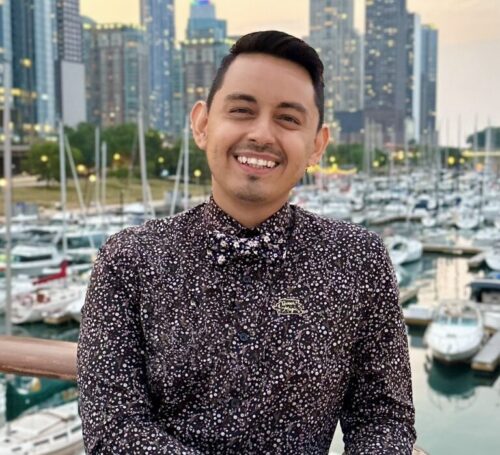Psychological Sciences graduate student explores connections between multicultural factors and substance use disorder
Written By: Rebecca Hoffa, rhoffa@purdue.edu

Luis Angel Gomez(Photo provided)
After witnessing firsthand his stepfather’s experiences with substance use disorder and the recovery process, Luis Angel Gomez, a doctoral student in Purdue University’s Department of Psychological Sciences, was motivated to find new ways to prevent substance use disorder and improve treatment.
“Not only did I see the destruction that substance use addiction can have on an individual and their family members — it can really impair daily functioning in work and social life — but I also got to see my stepfather’s recovery,” Gomez said. “He’s been in recovery for over 20 years now. I got to see the spectrum of addiction, from struggle to full recovery.”
Upon moving to San Francisco as a young adult, Gomez often heard stories told by friends and peers from minority backgrounds about their struggles with substance use. As a gay Latino man, Gomez is a member of two minority groups himself. He began to notice a common thread between individuals’ substance use and their histories of fearing discrimination, racism or homophobia. When he decided to pursue graduate school for clinical psychology, he knew this connection was where he wanted his research to begin.
“I realized that there are certain experiences that people from minoritized backgrounds come with or even continue to experience that may contribute to ‘Let me have a drink to take the tension off of the day that I’ve just experienced or the microaggressions that I have to deal with in my office at work,’” Gomez said. “That increases over time, and before you know it, this very subtle process (of addiction) where experiences of stigma, prejudice and discrimination — and even worse, from loved ones — can contribute to increased substance use as a way to cope.”
Gomez was able to connect with Jennifer Brown, associate professor of psychological sciences, and quickly found his fit in the research world at Purdue. Although he is only a couple months into his PhD program in clinical psychological sciences, Gomez plans to focus his independent research on exploring the intersection of sociocultural factors and substance use. He noted minority voices have historically gotten buried in certain areas of research, and he hopes to elevate their perspectives so their stories about culture, race, sexuality, gender and other factors help advance overall understanding of the development of substance use disorders and also guide how they might influence the design of culturally relevant treatments.
“I hope to bring to light to psychology and science as a whole how critical it is to study the unique contextual and multicultural factors of people’s lives: how negative experiences that minoritized communities endure contribute to dysfunction and what we can do about that to find areas for growth and design treatments that actually resonate with the people you’re trying to help,” Gomez said.
Gomez is one of two recipients of the College of Health and Human Sciences’ Graduate Excellence Fellowship for fall 2023. This fellowship is awarded annually to outstanding PhD students whose backgrounds, views and experiences will contribute to their respective field as well as Purdue’s overall excellence. Gomez said this fellowship, which provides funding for his first two years in the program, helps emphasize his commitment to conducting research focused on health equity.
“I’m committed to working with communities in a way that includes the voices of people who have historically been left out of research and the benefits of research,” Gomez said. “I’m very much trying to advance my field, to make it more inclusive, more equitable. We need to record the experiences of all individuals because people are not a monolith — cultures are not a monolith. My intention is to diversify my field’s understanding of substance use and other disorders.”
After graduating from the program, Gomez hopes to not only become a faculty member in an academic health center but also to work as a clinician or consultant to provide individualized services as well as shape programs and interventions.
Above all, he plans to continue his research far beyond graduate school to have a broad impact on health and well-being for minoritized communities.
“My expertise doesn’t just belong to me,” Gomez said. “It also belongs to the community. I want to work with them, and I want to work for them, and I want my data collection methods and my analyses to reflect that.”